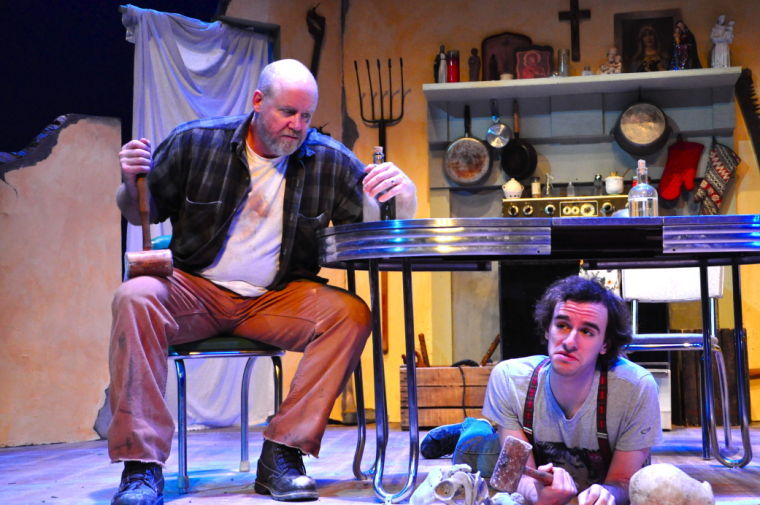‘A Skull in Connemara’ displays west Ireland’s dark humor
September 12, 2013
There are parts of western Ireland that are stunningly beautiful, attracting the attention of tourists from around the world. Connemara is one of those exquisitely mystifying areas.
But for the year-round residents of such a place — where economic opportunities are scarce and the granite-riddled land makes farming a painfully difficult task — the location paints a much different picture.
These are the circumstances that inspired Martin McDonagh’s “A Skull in Connemara,” a perversely dark comedy to be presented by the Pittsburgh Irish and Classical Theatre. The show will run from Sept. 12 to 28 at the Charity Randall Theatre in Oakland.
“The play’s roots are based in a kind of poverty and also a kind of communal village spirit,” Alan Stanford, producing artistic director of the Pittsburgh Irish and Classical Theatre, said. According to Stanford, the region’s poverty is also the source of its people’s resilience. “The people are as rugged and as tough and as relentless as the landscape they live in.”
The play’s story revolves around a local gravedigger named Mick Dowd — played by actor James Keegan — who is forced to disinter the bones of his deceased wife. Rumors resurface about Dowd’s culpability in her death, causing calamity to ensue within the small village.
“Everybody is sort of watching your business, and you are the news, whatever is happening in your life,” Keegan said in regard to the villagers portrayed in the play.
In a place as sparsely populated as Connemara, people can be very blunt about their suspicions. “There is a kind of willingness in the Irish character to take other Irishmen to task for who they are and what they’ve done,” said Keegan.
“There is a kind of vengefulness and, at times, a pettiness.”
McDonagh’s play captures that phenomenon, properly blending the modern with a traditional Irish representation. The playwright is no stranger to morbid comedy — on the contrary, he thrives on it. Though many may not recognize the playwright’s name, his work directing and writing the award-winning film “In Bruges” helped him gain notoriety as one of the premiere masters of bitterly dark humor, managing to balance wit and grit with ease.
“[A Skull in Connemara] has this beautiful style, but it also has this sort of nastiness and casualness of common people in a contemporary setting,” Martin Giles, director of the play, said. Giles praises McDonagh for portraying characters with an “unfiltered lens,” seeing them for who they are — their faults on full display.
Although the play takes on a serious matter, it is still a comedy — and a dark comedy at that. But in the words of Stanford, “All comedy is dark,” because we rarely laugh at ourselves. “We laugh at other people,” he said, before adding: “Because they are in trouble.”
As the story unfolds, Giles said the characters are seen as both “incredibly stupid” and “incredibly articulate — in a lot of ways like Shakespeare clowns.” This feature is one of the ways that McDonagh paints a picture of the wicked coast of western Ireland: A place rich in both history and landscape, but lacking in substance.
For Keegan, his portrayal of Mick Dowd is aided by his upbringing. Both of his parents were from Ireland — his mother from Tipperary and his father from County Meath — and he grew up listening to the accents of his family members, who still reside across the Atlantic.
“I grew up listening to that music,” he said in regard to hearing the Irish accents of his relatives.
With the area of Connemara on full display, McDonagh displays the humor and drawbacks that come with living in a tight community. But Stanford is quick to remind us that “everybody lives in a village,” and “[Connemara] is just a village set in the bleakest and most extreme part of topography of Ireland.”
With a story so brutally honest that it is categorized as a comedy, “A Skull in Connemara” is a look into a rather foolish and desperate way of life. As Giles describes it, the play is “fresh and irreverent and kind of nasty.”



